|
|
|
Sort Order |
|
|
|
Items / Page
|
|
|
|
|
|
|
| Srl | Item |
| 1 |
ID:
127486
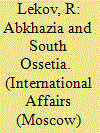

|
|
|
|
|
| Publication |
2013.
|
| Summary/Abstract |
IN TODAY'S DISCUSSIONS on ethno-political conflicts, Abkhazia and South Ossetia are as a rule considered together. Meanwhile, this approach is fraught with too strong a simplification. After all, the two republics, which have broken away from Georgia, have had very different paths to self-determination.
In the Soviet period, Abkhazia was much more poorly integrated into the social, political and cultural space of the Georgian SSR, compared with South Ossetia. Beginning in 1931, the Abkhaz ASSR from time to time witnessed calls for secession from Georgia and the creation of either a separate Union Republic, or for entry into the RSFSR.
|
|
|
|
|
|
|
|
|
|
|
|
|
|
|
|
| 2 |
ID:
096352
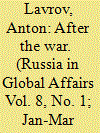

|
|
|
| 3 |
ID:
103921
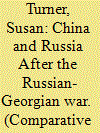

|
|
|
|
|
| Publication |
2011.
|
| Summary/Abstract |
China's public disagreement with Russia's actions during the Russian-Georgian War as well as China's decision not to support Russia's recognition of South Ossetia and Abkhazia demonstrate that despite their partnership, China and Russia pursue different strategies to gain power and influence. But is this to the detriment of their future relations? Drawing from over 800 Chinese news articles written after the war, I show that while China showed disapproval of Russia's actions internationally, domestically it used the war to highlight the escalating tensions between the East and West, and took a strategic stand on the side of the East.
|
|
|
|
|
|
|
|
|
|
|
|
|
|
|
|
| 4 |
ID:
090424
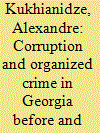

|
|
|
|
|
| Publication |
2009.
|
| Summary/Abstract |
The Soviet collapse in 1991 led to political turmoil, armed conflicts, rampant corruption, and to the growth of organized crime and smuggling in post-Soviet Georgia. Professional criminals called 'kanonieri kurdebi' ('thieves-in-law') captured the state, and criminalization of the government and law-enforcement structures caused a deep political crisis in the country and finally, revolutionary change of the political leadership. Massive arrests of most corrupt government officials, 'thieves-in-law', and other key criminals followed the Rose Revolution in 2003-2005. The new leadership implemented anti-corruption policies and law-enforcement reforms. The crime rate was reduced significantly. Yet, despite anti-corruption reforms, there continue to be repeated accusations of top government officials' involvement in 'elite corruption'. The lack of democracy and threats coming from Russia are the main reasons why Georgia remains a country of high risk, vacillating between stability and turmoil. Turmoil generates corrupt government and provides professional criminals with opportunities.
|
|
|
|
|
|
|
|
|
|
|
|
|
|
|
|
| 5 |
ID:
129429
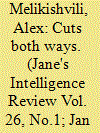

|
|
|
| 6 |
ID:
090418
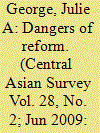

|
|
|
|
|
| Publication |
2009.
|
| Summary/Abstract |
Was the South Ossetian war of August 2008 inevitable? Although conditions between the Georgian, South Ossetian and Russian political leadership had hardened into seemingly intractable positions from 1991-2008, the manner and timing of the August war were not certain. Analysts of the events, seeking to show Georgian culpability, argue that the personality and authoritarian style of Mikheil Saakashvili led to a nationalistic policy that aimed to undermine the interests of Georgia's national minorities. While the Georgian national minority policy was not overtly chauvinistic and certainly not indicative of a full-scale crackdown on the secessionist territories, particular centralizing characteristics of Georgia's state-building programme, some of them necessary reforms after over a decade of political stagnation under Shevardnadze, contributed to the increasing tensions that were part of the lead up to the South Ossetian war.
|
|
|
|
|
|
|
|
|
|
|
|
|
|
|
|
| 7 |
ID:
111138
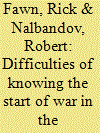

|
|
|
|
|
| Publication |
2012.
|
| Summary/Abstract |
The August War in 2008 generated incompatible accounts of the events causing its outbreak. Through an analysis of Russian language, Georgian language and major English print media, web and television sources, this article provides analysis of the empirical obstacles to objective knowledge; determines what we know, and what remains unknown, and demonstrating what is contested. It then shows the difficulties of being certain of the causes of war, the divergent terms and justifications used, and contends that the start of the war should not be treated as a single event. Rather, the start of the conflict must be understood in terms of an interlinking cycle of events.
|
|
|
|
|
|
|
|
|
|
|
|
|
|
|
|
| 8 |
ID:
123719
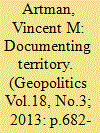

|
|
|
|
|
| Publication |
2013.
|
| Summary/Abstract |
Despite the crucial role it played in the 2008 war between Russia and Georgia, the phenomenon of passportisation has not received a great deal of scholarly attention. Much of the literature has treated the mass distribution of Russian passports to the residents of Abkhazia and South Ossetia as little more than a strategy to manufacture an excuse to go to war with Georgia. Drawing on recent scholarship on territory and territoriality, as well as with literature addressing Agamben's theories of exceptional spaces, this paper contributes to a more nuanced understanding of passportisation by analysing the territorial effects it produced. It argues that the wholesale conversion of Abkhazians and South Ossetians into Russian citizens did not merely manufacture a casus belli, it also produced exceptional spaces within the territory of the Republic of Georgia, where the norms of international law and the modern state system were effectively suspended.
|
|
|
|
|
|
|
|
|
|
|
|
|
|
|
|
| 9 |
ID:
192453
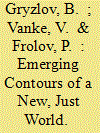

|
|
|
|
|
| Summary/Abstract |
THIRTY-TWO years ago, an event took place that American political scientist Francis Fukuyama claimed marked the "end of history." It was argued that the disappearance of the Soviet Union from the world political scene and the end of the Soviet socialist project meant that there was no socioeconomic alternative to a liberal capitalist world order - a system that puts the individual above society and private business above national interests and gives overconsumption priority over progress.
|
|
|
|
|
|
|
|
|
|
|
|
|
|
|
|
| 10 |
ID:
095116
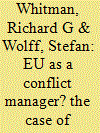

|
|
|
|
|
| Publication |
2010.
|
| Summary/Abstract |
This article offers an analysis of the EU's engagement in Georgia as a standpoint from which to assess the EU's role as a conflict manager. The article begins with a brief narrative account of the development of EU-Georgia relations in the context of the country's two unresolved conflicts over Abkhazia and South Ossetia. It then proceeds to the analysis of two sets of factors-those within, and those external to, the EU-that are crucial for understanding the nature and impact of EU efforts to manage the two Georgian conflicts. On the basis of this case-study analysis, the authors offer a wider analysis of the EU's potential for assuming a wider role as an international security actor. This is undertaken by considering both the limitations of the EU's existing capabilities for conflict resolution and the new developments contained within the Lisbon Treaty. The final part of the article asserts that the EU has suffered from two key weaknesses that have prevented it from living up to its aspirations of becoming a globally significant and effective conflict manager. The first is structural-the lack of, to date, a permanent External Action Service; the second is conceptual-the lack of a coherent and comprehensive conflict management strategy. The article concludes with five substantive principles that should guide the EU's approach to conflict management.
|
|
|
|
|
|
|
|
|
|
|
|
|
|
|
|
| 11 |
ID:
101865
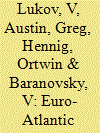

|
|
|
|
|
| Publication |
2010.
|
| Summary/Abstract |
The idea of writing this report emerged in a situation that, to put it mildly, was not conducive to a grand scientific and political debate over European security issues. Even though the cannonade in South Ossetia had already died down, a full-blown diplomatic exchange of fire continued between the West and Russia over the Caucasus war.
|
|
|
|
|
|
|
|
|
|
|
|
|
|
|
|
| 12 |
ID:
143216
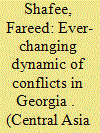

|
|
|
|
|
| Summary/Abstract |
In this article, I will trace the dynamics and changes in internal conflicts in Georgia (Georgian-Ossetian and Georgian-Abkhazian conflicts), and investigate the role of external factors and their interplay with internal factors affecting the dynamic of the conflicts. Mainstream academic literature views the two conflicts as internal. However, after the war in August 2008 that saw visible intervention from Russia, the conflicts, I argue, have turned into intra-state conflict between Georgia and Russia. My further argument is about the decisive role of external factors in the conflicts. The Western and Georgian media tend to emphasize the role of Russia in the conflicts; academic literature is divided over the issue of the influence of external factors. I acknowledge that sometimes Russia’s role is exaggerated and that less attention is paid, particularly in Georgia, to Tbilisi’s wrongdoings. However, overall, the presence and influence of external factors, on at least two occasions, modified the dynamic of the conflicts. Here, along with Russia, other outside players, such as the United States, contributed to the conflicts.
|
|
|
|
|
|
|
|
|
|
|
|
|
|
|
|
| 13 |
ID:
090014


|
|
|
|
|
| Publication |
2008.
|
| Summary/Abstract |
The armed conflict in South Ossetia destroyed not only most of the homes, schools, universities, administrative buildings, including the OSCE office, but also Tskhinval's historical landmarks, including the Jewish quarter, a war memorial, medieval churches and a synagogue - all in all, more than ten unique landmarks of the cultural heritage. This constitutes a violation of such fundamental international laws as the 1954 Hague Convention for the Protection of Cultural Property in the Event of Armed Conflict, and the 1972 Convention
|
|
|
|
|
|
|
|
|
|
|
|
|
|
|
|
| 14 |
ID:
179200
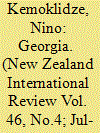

|
|
|
|
|
| Summary/Abstract |
Georgia suffered significant violence during and following the demise of the Soviet Union at the end of 1991. It left Abkhazia and South Ossetia outside the control of the republic, and in 2008, following the Russia-Georgia War, Russia recognised them as independent states, a status acknowledged only by a handful of other states. The Kremlin proclaimed the right of self-determination and secession, but the situation is not straightforward because Georgia has traditionally been multi-ethnic. People have lived side-by side relatively peacefully in Abkhazia and South Ossetia for centuries. The de facto secession poses many dangers of ethnic strife for the future.
|
|
|
|
|
|
|
|
|
|
|
|
|
|
|
|
| 15 |
ID:
134119
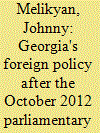

|
|
|
|
|
| Publication |
2014.
|
| Summary/Abstract |
The author looks at the key foreign policy trends and changes that became obvious after the parliamentary elections of October 2012.
The article's first part describes Georgia's foreign policy under President Saakashvili when Georgia received its first conceptual documents-the National Security Concept and the Military Doctrine-both geared toward Europe and the closest possible cooperation with NATO, revised regional relations, and a new agenda.
The second part deals with the changes in Georgia's foreign policy that took place after the presidential elections of 1 October, 2012, when the opposition Georgian Dream Coalition won the majority of seats in the Georgian parliament and the post of prime minister for its leader, Bidzina Ivanishvili. The newly emerging relations between Georgia and Russia and the efforts of the Georgian leaders to resume their dialog with Moscow are also analyzed.
The concluding part offers an overview of Georgia's relations with the European structures, its progress toward an association with the European Union, the course of the talks, and the way this association will affect the main spheres of the country's life.
|
|
|
|
|
|
|
|
|
|
|
|
|
|
|
|
| 16 |
ID:
095162


|
|
|
|
|
| Publication |
2009.
|
| Summary/Abstract |
Sixteen years after the Sochi agreements an uneasy truce between Georgia and South Ossetia gave way to renewed violence in August 2008. The protracted peace process with lengthy and futile negotiations led to few agreements between the conflicting sides, which were often faulted at the implementation phase. Material and human costs of a failed peace process were huge: hundreds of civilian deaths, thousands of wounded, tens of thousands of people displaced, and millions of Euros spent on rehabilitation projects by local and international actors vanished within days.
|
|
|
|
|
|
|
|
|
|
|
|
|
|
|
|
| 17 |
ID:
132146
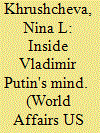

|
|
|
|
|
| Publication |
2014.
|
| Summary/Abstract |
Civilians are dying?.?.?.?in South Ossetia?.?.?.?the majority of them are citizens of the Russian federation.?.?.?.?We will not leave unpunished the deaths of our compatriots. The guilty parties have brought upon themselves the punishment they deserved." This announcement about the invasion of Georgia's territory came from then Russian President Dmitri Medvedev in August 2008. Medvedev was firm, citing the Russian Constitution and federal law, but while it was his lips moving, the words were clearly those of Vladimir Putin.
|
|
|
|
|
|
|
|
|
|
|
|
|
|
|
|
| 18 |
ID:
118738
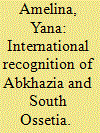

|
|
|
|
|
| Publication |
2012.
|
| Summary/Abstract |
The August 2008 war and recognition, on 26 August, 2008, of the independence of the Republic of Abkhazia and the Republic of South Ossetia by the Russian Federation and, later, by several other countries created a new situation in the Greater Caucasus, which many of the regional and world geopolitical players have found unpalatable. Their active efforts to change the new reality run up against the recognition of independence of these two states, which Russia cannot revoke without losing its international prestige and influence in the Caucasus right up to possible secession of the Northern Caucasus. The above-mentioned players have no choice but to use force to liquidate the republics of South Ossetia and Abkhazia; if this happens, complete and final destabilization of the Caucasus will be inevitable.
|
|
|
|
|
|
|
|
|
|
|
|
|
|
|
|
| 19 |
ID:
089327
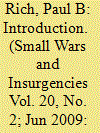

|
|
|
|
|
| Publication |
2009.
|
| Summary/Abstract |
On 8 August 2008 Russian troops invaded Georgia in a short military operation that has led to an effective Russian takeover of the South Ossetia and Abkhazia.The immediate case of the invasion was a dispute over the status of the region of South Ossetia, which up to 1990 had formed an autonomous Georgian Soviet Republic.
|
|
|
|
|
|
|
|
|
|
|
|
|
|
|
|
| 20 |
ID:
137298


|
|
|
|
|
| Summary/Abstract |
I am pleased to welcome the participants in the First Forum of Young Diplomats from the CIS countries, Abkhazia and South Ossetia. I am confident that we will have an interesting discussion and I hope that you will enrich your knowledge at its close as a result of the exchange of views, plans and ideas. Such meetings will be scheduled on a regular basis and will be a useful venue for young professionals to discuss topical issues of international life and the regional agenda.This is important because you are our hope and our successors.
|
|
|
|
|
|
|
|
|
|
|
|
|
|
|
|
|
|
|
|
|